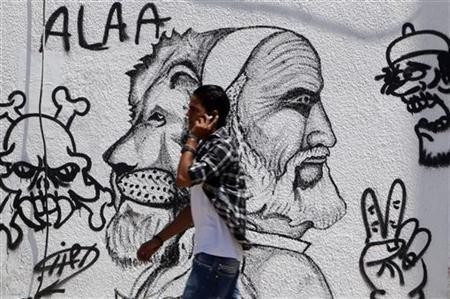Libyan conflict: An East-West Battle?

Chinese President Hu Jintao told his South African counterpart, Jacob Zuma, on Thursday that China will continue to work with the African Union in finding a solution to the Libyan crisis, state news agency Xinhua reported.
Both Turkey and the African Union have proposed separate road maps that aimed at the establishment of a ceasefire at the implementation of different stages that would lead to the departure of Muammar Gaddafi and followed by a democratic transition.
China said last Thursday it would skip last week's meeting in Turkey between Western powers, Arab governments and leaders of Libya's opposition National Transitional Council (TNC), saying that the way the group worked needed "further study".
The U.S. took a prominent part in the discussion during the meeting, and came out declaring the Gaddafi regime was now illegitimate. At the issue of the meeting, Secretary of State Hillary Clinton also announced the U.S now recognises the TNC as the legitimate representative of the Libyan people.
However, playing down the role of countries like France, which has last week insisted it always wanted a political solution to the conflict, Hu told Zuma, "South Africa and the African Union have played an important role in pushing a political solution for the Libyan issue, which shows the resolve of African countries to 'use an African method to solve an African issue,'"
"China greatly appreciates this, and is willing to continue remaining in close touch and coordinate closely with South Africa and the African Union on the Libya issue."
Also splitting further away from the coalition forces and their Nato-led operation in Libya, the Chinese president reportedly told his South African counter-part that China calls for an immediate ceasefire and a solution to the Libyan crisis "through dialogue and consultations", Xinhua reported.
While China did not use its veto in March to block a U.N. Security Council resolution that authorised the NATO bombing campaign against Libya, it however did not waste anytime condemning the strikes and has since then repeatedly reiterated the need for a ceasefire and compromise between the government and rebels.
China has recently met both Libyan government and rebel representatives, and Beijing denying claims China would now officially support the rebels, spokesperson for the government have insisted it was part of an effort to encourage a negotiated end to the fighting.
The Chinese President's comments came as his French Counterpart received rebel General Ramadan Zarmuh, Colonel Ahmed Hashem and Colonel Brahim Betal Mal, as well as Suleiman Fortia, a local representative of the rebel leadership in Misrata, at his Elysee presidential palace in Paris.
Also France said on Wednesday that Gaddafi could stay in Libya if he gives up power, backing Foreign Minister Alain Juppe's claims that the country was determined to push for a diplomatic solution to the problem.
However contradicting the French government official position, those who attended the talks seemed to hint that the meeting might have focused on assuring the rebels a military victory.
"With a little bit of help, we will be in Tripoli very soon. Very soon means days," Fortia told reporters after the meeting. "We are here in France to discuss how we can do the job."
"Misrata's fighters are disciplined, battle hardened and they have a key asset: a military victory already won" against loyalist forces, French writer Bernard-Henri Levy who supports the rebels and attended the talks told the AFP after the meeting.
Meanwhile despite the African Union calls for a cease-fire from all parties, RAF and French air force jets continue to attack Gaddafi's forces while the bombing campaign on Tripoli is still on-going.
The Libyan conflict has been the occasion for China, a country that very rarely agrees to become entangled in the domestic affairs of other states to take a firm position on the international level. Short from siding with the West, China has instead made it clear it will continue to side with the African Union, which in view of the close business ties that the country has on the continent is not surprising.
On the other hand, the Nato bombing campaign and operation has repeatedly been criticised by African countries and rights groups for affecting civilians and destroying the city.
Clearly, the East and West have opted for two different attitudes to the conflict and demonstrated that the international community is now clearly divided on issues such as conflict resolutions.
In any case, once the conflict is over and with or without Gaddafi present on the territory, Libya will have a long way to go before it can recover stability, peace and democracy.
© Copyright IBTimes 2025. All rights reserved.





















